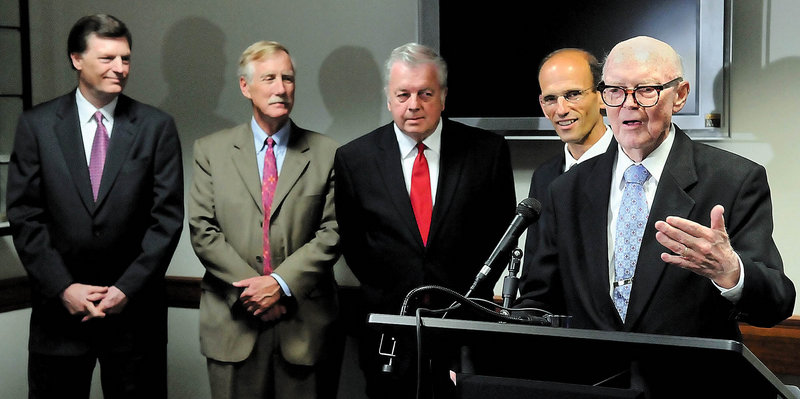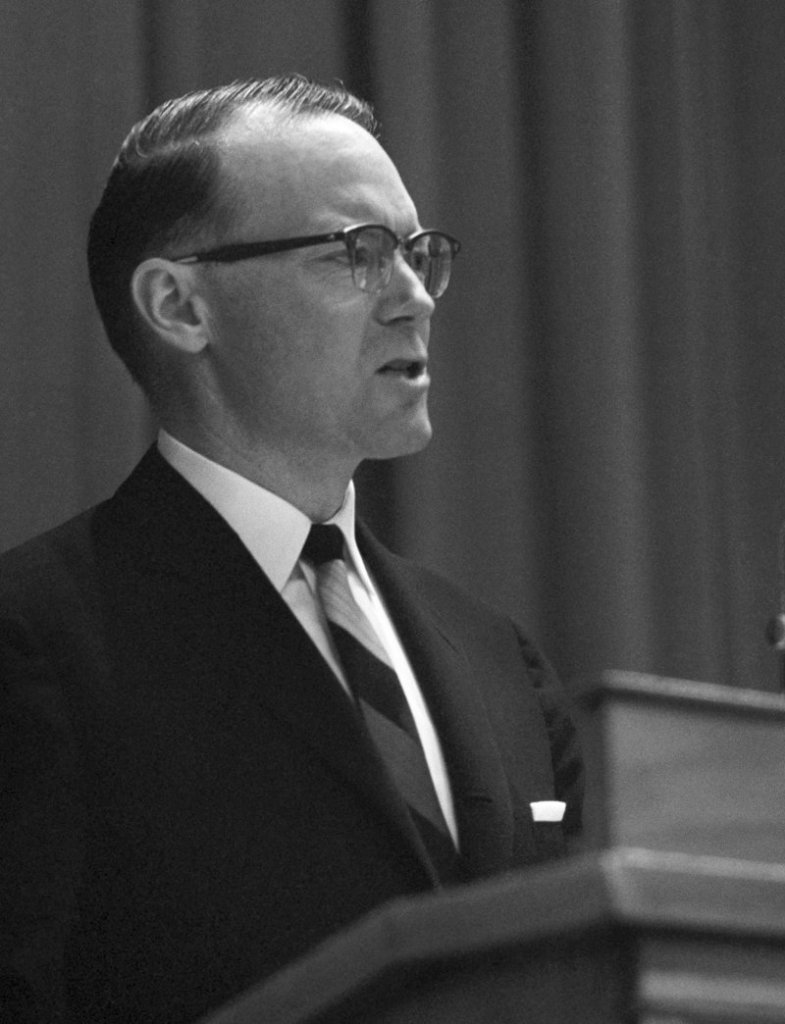At 4:30 in the morning on Dec. 30, 1959, the telephone rang in John Reed’s home in Fort Fairfield.
Reed, the 38-year old president of the state Senate, had planned to get out of bed anyway to load a car with potatoes at his family’s farm, which encompassed 1,300 acres around his hometown, 290 miles northeast of Portland.
He picked up the receiver, taking the call that would change his life.
Gov. Clinton Clauson had died unexpectedly in the night. Reed was to rush to Augusta to be sworn in as his successor.
“It was a great emotional impact upon me and my family, because I never did envision to get into full-time politics at all,” Reed told an interviewer with the Bates College Muskie Archives nearly a half-century later. “When something like this happens you try to do the best you can and move forward.”
Reed, who died Wednesday in Washington, D.C., at the age of 91, would go on to win election twice as Maine’s chief executive, lead the National Governors Association and serve as U.S. ambassador to Sri Lanka and the Maldive Islands.
A liberal Republican in an era when there were many like him, Reed championed investments in higher education and water quality improvement in Augusta, and became a friend and ally of Democratic President Lyndon B. Johnson on the national stage.
“We called ourselves Rockefeller Republicans, and John Reed was a good bipartisan person,” said Reginald Bowden of Orono, who was Reed’s press secretary from 1961-65. “He was a liberal, even though I don’t think he thought of himself as one, and supported civil rights and was a great supporter of labor.”
“It was a different time,” Bowden said. “There was a great deal of compromise and he was a supporter of that.”
John Hathaway Reed was born on Jan. 5, 1921, in the three-story Queen Anne-style mansion that his grandfather built on Lower Main Street in Fort Fairfield.
Philo Reed had moved to town in 1880, and sought and found fortune in the Aroostook County soil. He co-founded a local bank, a hotel and the chamber of commerce, stabled harness racing horses and reportedly owned the first automobile in the community.
Reed was born into the family business, Reed Brothers, a farming enterprise owned by his father and uncle. He often said he enjoyed and fully intended to remain in the business and The County, and would have continued doing so had fate not intervened.
He studied agricultural economics at the University of Maine and, after graduation, taught agriculture in Hodgdon for a few months until he enlisted in the Navy.
He joined the service nine months after Pearl Harbor, but spent most of the war stateside. While a supply officer at the Newport Naval Supply Depot in Rhode Island, he met the commanding officer’s executive secretary, Cora Davison. They married at the base’s chapel in March 1944.
After Japan’s surrender (and Reed’s brief deployment to Okinawa), the couple moved to Fort Fairfield and Reed returned to farming.
In Fort Fairfield, Reed became president of the local hospital association and director of a local bank and, in 1954, was elected to the Maine House.
“I didn’t really expect to get fully involved in politics,” he told the Muskie Archives in 2003. “I always thought it would be great to serve a term in the Legislature. … I was fully engaged in farming … (but my) father and my brother felt the Legislature meets in the winter and they could spare me then, and so that’s when I decided to run.”
While he always claimed to be a reluctant politician, he rose quickly. He had campaigned for Republican Gov. Burton Cross, who served as his mentor, encouraging him to run first for the House and then, in 1956, for the state Senate, where he served as president.
In the House, he supported Democratic Gov. Edmund Muskie’s clean-water initiatives. As Senate president, Reed had what he described as “great relations” with Gov. Clauson, another Democrat.
Reed served for seven years — finishing Clauson’s first two years then winning elections in 1960 and 1962.
“He was a big supporter of education and agriculture, especially capital projects at the Orono campus and what were then called the teachers’ colleges,” said Bowden. “He made good appointments and assembled a really good team.”
“Reed’s time as governor was kind of like Eisenhower’s as president: nothing really big happened but everyone was happy,” the retired journalist Don Larrabee told the Bangor Daily News in 1997. “Reed was clean as a hound’s tooth.”
As chairman of the National Governors Association, Reed supported President Johnson’s civil rights agenda, as well as his escalation of the Vietnam War.
Reed met Johnson on an aircraft carrier during an association meeting in Hawaii before President John F. Kennedy’s assassination.
“He’s a rancher from Texas and I was a Maine farmer, and we hit it off very well,” Reed said.
Reed later shipped Johnson some Maine deer to improve the breeding stock in central Texas, and would visit him on his ranch. Johnson, who appreciated the Republican governor’s support, later appointed Reed to the National Transportation Safety Board.
Had Reed won re-election in 1966, he would have served a total of 11 years as governor, a fact his Democratic challenger noted.
“My campaign slogan was ‘Seven But Not Eleven,”‘ said Kenneth Curtis, who was governor from 1967 to 1975 and worked with Reed while serving as secretary of state in 1965-66.
“He was a moderate who had come up through the ranks in the Republican Party,” Curtis said. “He was honest and had all kinds of integrity and did his job. He didn’t start too many new things, but what he did, he did well.”
“Politics was a lot different in those days,” Curtis said. “When I was running against him, I don’t remember him ever saying anything derogatory about me.”
After Johnson appointed him to the NTSB, Reed and his wife moved to Washington. They never again lived in Fort Fairfield, though Reed said his heart always remained there.
For decades, they spent summers at their cottage on North Pond in Smithfield, 25 miles north of Augusta, where he is remembered as a man with respect for people from all walks of life.
“It didn’t matter if you were the roughest redneck or the most distinguished member of the Legislature, he could navigate any conversation and make everyone feel warm and respected,” said Christine Keller, a friend and former neighbor, who recalls Reed’s support of the North Pond Lake Association, which protected the health of the lake.
“He was a wonderful orator,” said Timothy Downing, who owns Duratherm Corp. in Vassalboro and attended Smithfield Baptist Church with Reed. “When the pastor would ask for someone to read passages and Gov. Reed was in the congregation, no one would raise a hand because it was just such a treat to hear him.”
In 1974, President Gerald Ford appointed Reed ambassador to Sri Lanka. Reed and his wife moved into a British colonial-era mansion in Colombo, attended by 11 servants. He served a total of six years there, in two stints. The last one ended in 1985, when a long-simmering uprising by ethnic Tamils flared into a bloody civil war that only recently concluded.
His wife, Cora, died in 2004.
“He was so good to her,” their summertime neighbor Keller said. “When his wife passed away, he wore her ring, her diamond, on his pinkie, in her memory. I remember thinking, ‘There really is true love.”‘
Reed died Wednesday at George Washington University Hospital in Washington. He is survived by two daughters, Cheryl Reed of Alexandria, Va., and Ruth Ann Duford of Groveland, Mass..
“We are profoundly saddened to learn of the passing of our extraordinary longtime friend whose life exemplified the finest ideals of public service,” U.S. Sen. Olympia Snowe and her husband, former Gov. John McKernan, said in a statement Thursday. “Governor Reed contributed immeasurably to his beloved Maine and, indeed, the entire nation, and our thoughts are with his wonderful daughters and his entire family.”
“No matter where Governor Reed went … he never forgot his “County roots,”‘ said U.S. Sen. Susan Collins in a prepared statement. “Governor Reed was a dear friend, and as a fellow native of Aroostook County, I know how proud he was of the people and the place he always considered home.”
Morning Sentinel Staff Writer Matt Hongoltz-Hetling contributed to this report.
Staff Writer Colin Woodard can be contacted at 791-6317 or at:
cwoodard@mainetoday.com
Copy the Story Link
Send questions/comments to the editors.




Success. Please wait for the page to reload. If the page does not reload within 5 seconds, please refresh the page.
Enter your email and password to access comments.
Hi, to comment on stories you must . This profile is in addition to your subscription and website login.
Already have a commenting profile? .
Invalid username/password.
Please check your email to confirm and complete your registration.
Only subscribers are eligible to post comments. Please subscribe or login first for digital access. Here’s why.
Use the form below to reset your password. When you've submitted your account email, we will send an email with a reset code.